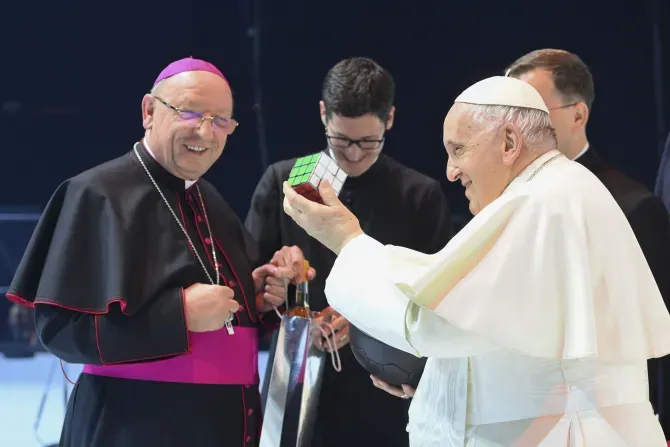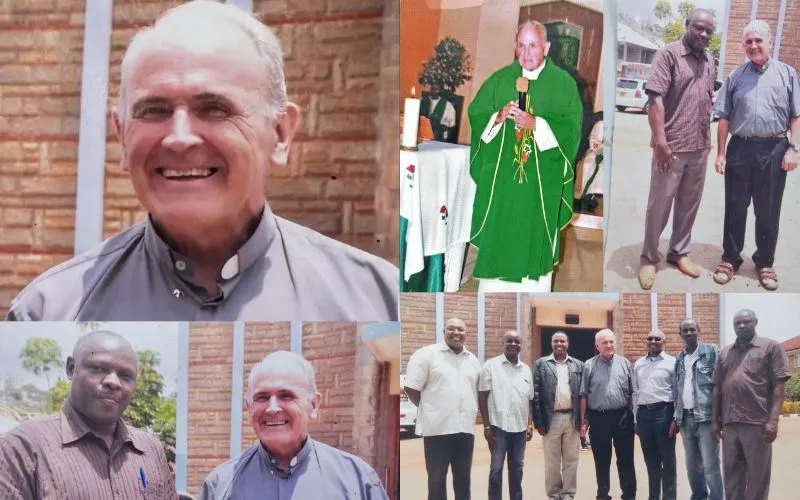Nowadays, we are bombarded with the message that we have to be fast, efficient, and practically perfect, like machines! Then we often find that we run out of gas and are at a loss for what to do. We have to learn how to stop and fill our tanks, to recharge our batteries. Here though, I would also say: Be careful not to indulge in moodiness or brood over your troubles. Don’t waste time thinking about who did this or that to me, questioning other people’s motives. That is not good or healthy either.
Silence is the soil on which we cultivate good relationships. It allows us to entrust to Jesus whatever we are feeling, to bring him faces and names, to share our difficulties, to remember our friends and to say a prayer for them. Silence gives us a chance to read a page of the Gospel that can speak to our hearts, to worship God, to regain our inner peace. Silence allows us to pick up a book that we don’t have to read, but one that can help us learn how to read human hearts. Silence enables us to observe nature, so that we are not just in contact with appliances and devices, but discover the natural beauty that is all around us.
Silence is not for sitting glued to your cell phone, or on social media. No, please! Life is real, not virtual. It does not take place on a screen, but in the world!
Silence, then, is the door to prayer, and prayer is the door to love. Dóra, I want to thank you because you said that faith is a love story, where every day you deal with the problems of adolescence, but you know that there is always Someone at your side, Someone who is there for you, and that Someone is Jesus. He does not hesitate to help you overcome every obstacle on your path. Prayer helps you in this, because prayer is dialogue with Jesus, just as Mass is an encounter with him, and Confession is the embrace you receive from him.
This reminds me of your great musician Franz Liszt. During the restoration of his piano, a few beads from his rosary were found; the rosary had broken and those beads had fallen into the instrument. This makes us realize that before a composition or performance, perhaps even after a moment of enjoyment at the piano, it was usual for him to pray. He spoke to the Lord and Our Lady about what he loved and he brought his art and talents to prayer. When you pray, don’t be afraid to bring to Jesus everything that is going on in your life: your emotions and fears, your problems and expectations, your memories and hopes.
(Story continues below)
Prayer is dialogue; prayer is life. Bertalan, today you were not ashamed to tell everyone about the anxiety that sometimes grips you and about your struggles with faith. What a beautiful thing it is to have this courage of honesty. Instead of having to act as if you are never afraid, you can freely share your vulnerability with the Lord and with others, without hiding or disguising anything, without wearing a mask.
On every page, the Gospel tells us that the Lord does not do great things with exceptional people, but with ordinary people. Those who count on their own abilities and are anxious always to look good before others, keep God away from their hearts. Jesus, by his questions and by his love, together with his Spirit, acts deep within us to make us real, authentic people. And today we have great need of such real and authentic people.
I think we were all struck by what you said, Tódor, starting with your name, which honors Blessed Theodore, a great confessor of the faith who inspires us to not live by half measures. You wanted to issue a “wake-up call,” reminding us that our zeal for the mission can be blunted by living in security and comfort, while not far from here war and suffering are daily realities. This is the real challenge: to take control of our lives in order to help our world to live in peace. Each one of us should ask the uncomfortable question: What am I doing for others, for the Church, for society? Do I think only about myself? Or do I put myself on the line for others, without calculating my own interests? Let us reflect on our ability to be generous, our ability to love as Jesus taught us, which is by serving others.
The power of sharing
Dear friends, there is one last thing I would like to share with you. It is a page of the Gospel, which sums up everything that we have said. A year and a half ago, I was here for the Eucharistic Congress. In the sixth chapter of John’s Gospel there is a beautiful eucharistic passage with a young person at the center. He was part of the crowd listening to Jesus, and he had planned ahead: He brought his lunch with him. Jesus feels compassion for the crowd and wants to feed them; so, again in his typical way, he asks the disciples questions to get them to act. He asks one of them how they could feed the crowd, and gets a “bookkeeper” response: “Six months’ wages would not buy enough bread for each of them to get a little” (Jn 6:7). As if to say: mathematically, it is impossible.
Another disciple, meanwhile, sees the young person and makes an equally pessimistic comment: “There is a boy here who has five barley loaves and two fish. But what are they among so many people?” (v. 9). For Jesus, though, it was enough to perform the famous miracle of the multiplication of the loaves and fishes.
 Pope Francis address young people at a sports arena in Budapest, Hungary, on April 29, 2023. Vatican Media
Pope Francis address young people at a sports arena in Budapest, Hungary, on April 29, 2023. Vatican Media
However, there is one detail the Gospel does not tell us, but leaves it to our imagination. How did the disciples persuade that young man to give everything he had? They may have asked him to make his lunch available, and he may have looked around, seeing thousands of people, and perhaps responded as they did, by saying, “It’s not enough; why are you asking me and not handling this yourselves, as Jesus’ disciples?” Perhaps too, they told him that Jesus himself was the one who was asking. In any event, the young man does something extraordinary: He trusts; he gives everything away, holding nothing back. He had come there to receive from Jesus, and now he finds himself giving to Jesus.
Yet that is how the miracle happened. It started with sharing: Jesus’ multiplication of the loaves and fish started with a young person who shared with him, for the sake of others. In Jesus’ hands, the little he possessed became much. Faith is that way: It starts with giving freely, with enthusiasm and generosity, overcoming our fears and stepping forward!
Dear friends, each of you is precious to Jesus, and also to me! Remember that no one can take your place in the history of the Church and the world: No one can do what only you can do. Let us help each other, then, to believe that we are loved and precious, that we are made for great things. Let us pray for this and encourage one another in this! I ask you, too, to help me by your prayers. Köszönöm! [Thank you!]

Pope Francis was born Jorge Mario Bergoglio on Dec. 17, 1936 in Buenos Aires. After earning a secondary school degree as a chemical technician, Bergoglio felt a call to the priesthood as a Jesuit, joining the novitiate in 1958, at the age of 22.
He was ordained a priest on Dec. 13, 1969. In 1973 he made his perpetual vows in the Society of Jesus and the same year was elected Jesuit provincial for Argentina. He would go on to serve as a seminary rector, a pastor, a professor, and a spiritual director.
In 1992 Fr. Bergoglio was consecrated an auxiliary bishop of the Buenos Aires archdiocese. He became the archdiocese’s coadjutor archbishop in 1997, and succeeded as archbishop the following year. St. John Paul II named Archbishop Bergoglio a cardinal in 2001.
As president of the Argentine bishops’ conference from 2005 to 2011, Bergoglio attended the Fifth Latin American Episcopal Conference held in Aparecida, Brazil in May 2007.
He was in charge of the drafting of the meeting’s final document, which came to be known as the Aparecida document, recognized as an important guiding document for the Church in Latin America and beyond.
On March 13, 2013, Bergoglio was elected to the papacy, at the age of 76. He was the first Jesuit and the first Latin American to become pope.




 Pope Francis is driven on a cart inside a sports arena in Budapest, Hungary, on April 29, 2023, where he held a meeting with young people. Vatican Media
Pope Francis is driven on a cart inside a sports arena in Budapest, Hungary, on April 29, 2023, where he held a meeting with young people. Vatican Media
 Pope Francis reacts to the audience during his meeting with young people at a sports arena in Budapest, Hungary, on April 29, 2023. Vatican Media
Pope Francis reacts to the audience during his meeting with young people at a sports arena in Budapest, Hungary, on April 29, 2023. Vatican Media Pope Francis address young people at a sports arena in Budapest, Hungary, on April 29, 2023. Vatican Media
Pope Francis address young people at a sports arena in Budapest, Hungary, on April 29, 2023. Vatican Media


